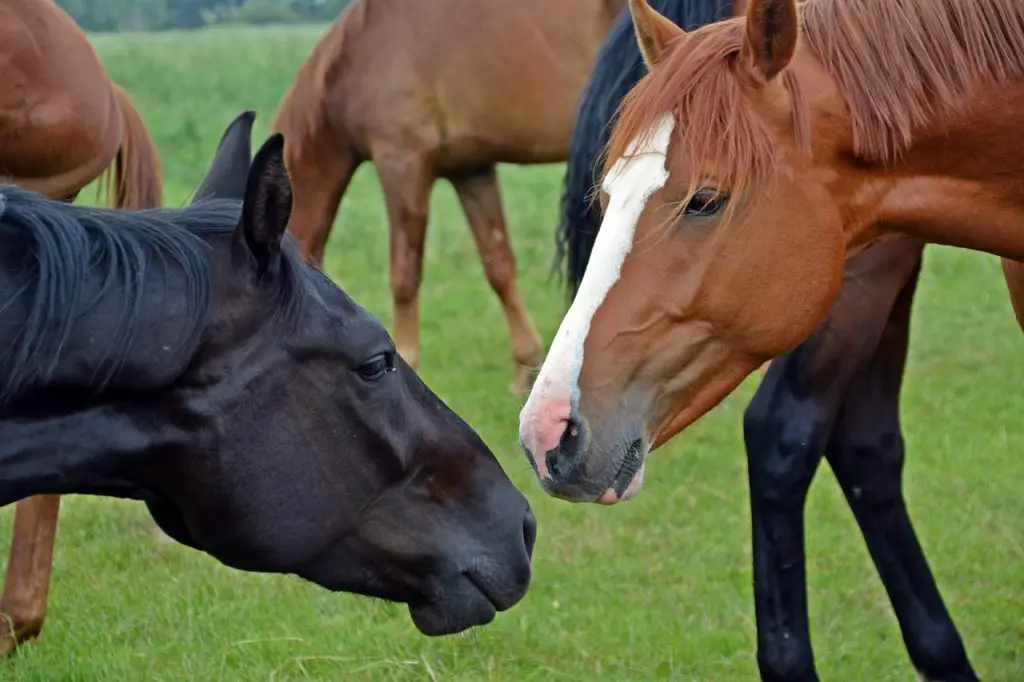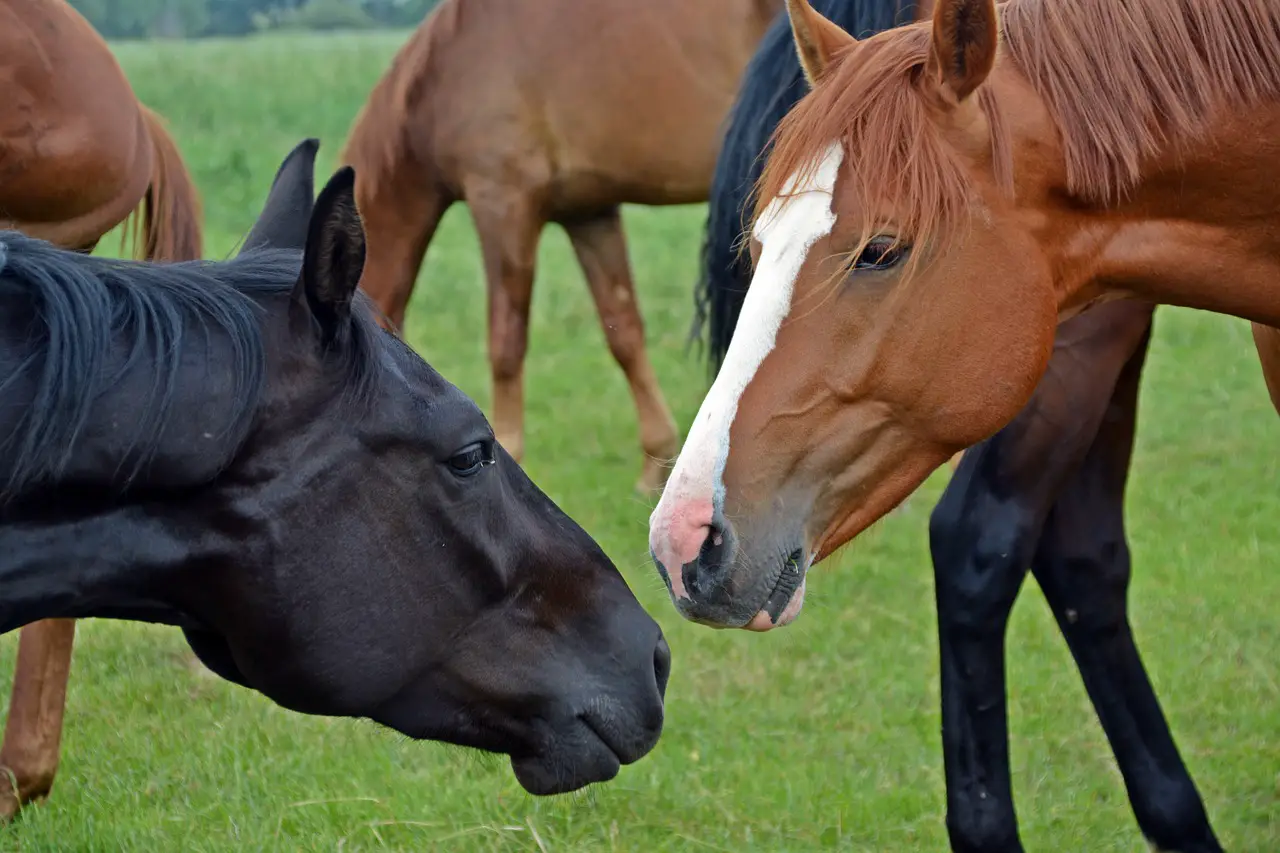Last Updated on March 15, 2022 by Allison Price
Although your horse may have quirky behavior, it could be indicative of a more serious condition. How can you tell the difference in an unusual, but benign, behavior and a sign of something wrong?

Gil Riley, Petplan Equine veterinarian expert, says that if your horse is healthy, happy, and performing well, then a recurring behavior is likely to be a part of his personality. “But, some behaviors could be indicative of an underlying problem that should not be ignored.
You should mention any of these signs to your veterinarian if you notice them. Gil emphasizes that these signs could be a sign of your horse’s overall health. So trust your gut instincts, regardless how minor they may seem.
1. Resting a foreleg
A healthy horse would not rest his forelimb. This could indicate pain in the hoof or leg.
Gil says that a horse who bends at the knees and rests his toes on the ground could feel discomfort in the soft tissues, such as the tendon, at the back or side of his leg. Another reason he may not be able to lift his full weight is osteoarthritis in his knee.
“Lifting a heel can indicate infection or bruising in the area. A pointed forelimb could be an attempt at relieving pressure on the toe, where the laminae are concentrated,” he says. He explains that laminitis is the inflammation of sensitive tissue layers. Other signs may include a hot, tender area, a feeling of warmth, a sensation of a pulse beneath the skin, and signs of pain such as hoof testers, lameness, walk, or trot. These symptoms should be checked by your veterinarian as soon as possible.
2. Strange stretches
Horses that stretch their legs excessively or act cat-like could have abdominal or back problems.
Gil explains that stretching is a common way to decrease pressure in the stomach and intestines. This could be a sign that your horse has low-grade, grumbling Enteritis or ulcers. It could also be due to your horse’s spine. Gil says that modern imaging techniques have made it possible to examine the spine more efficiently. “We are also more aware about disc diseases like spondylosis and sacroiliac joints problems, which could cause horses to stretch to relieve pain.
Gil recommends that you have your veterinarian give your horse a health check and make sure his saddle isn’t causing any problems. A short course of prescribed pain medication could be helpful to determine if your horse’s behavior changes. He adds that stretching could be a sign of ageing or an idiosyncrasy of your horse. As a horse grows older, it is not surprising that his joints and tissues become stiffer.
3. Discomfort at speed
Trot and canter can make acid slosh around your horse’s stomach. This can irritate any ulcers that he might have.
“Funny behavior at faster speeds could indicate the presence of stomach ulcers,” Gil says. He also mentions that horses who are resistant to girthing, have a dull coat, or are otherwise in poor health can be a sign of ulcers. Your vet might suggest a gastroscopy. This involves a flexible, fibreoptic endoscope being passed up one nostril of your horse and into his stomach to examine its lining.
4. Perching
Your horse could be sore if he rests his hindquarters on a field fence, wall or bedding bank.
Gil says that if your horse is experiencing low-level pain in his joints or feet, he might adjust the angle of his legs to get some relief. Horses are flight animals so adrenalin may temporarily mask your horse’s pain. However, chronic and lingering discomfort can catch up to him. These signs will often be visible while he is at rest or in his stable.
5. Tail clamping
The tail is a natural protector, so any hesitation to have it trimmed could indicate that your horse is not well.
Gil says that clamping can be a nerve response. Perhaps the horse has been traumatized. There are clinical reasons for tail fussiness. Sweet itch could be a possibility. Grey horses can develop skin tumours in their under-tails.
“Another possible cause is pinworm infestation, which is a hind-gut parasite that lays its eggs around the anus and causes irritation.”
6. Tooth grinding
The grinding of the cheek teeth is known as bruxism. It often occurs in conjunction with other stress-related behaviors like crib-biting and weaving. It can also be an indication of pain elsewhere in your body.
Gil says that there is often a link between tooth grinding, stomach ulcers, or discomfort. It is not true that horses’ teeth will continue to grow throughout their lives. It is important to treat any root causes of grinding as the tooth is slowly erupting from a reserve.
7. Losing weight
All of us know horses that can’t stay still. However, constant shifting of bodyweight is a different thing to general restlessness and misbehaviour.
Gil says that it can be hard to pinpoint the exact cause. Don’t worry if your horse isn’t fidgeting but you don’t feel lame. If soundness is a concern, it’s a good idea to inform your vet. Certain breeds or individual personalities are more cautious than others. It all comes down to understanding your horse and what is normal for him. Do not hesitate to seek professional advice if you feel that something is unusual.


